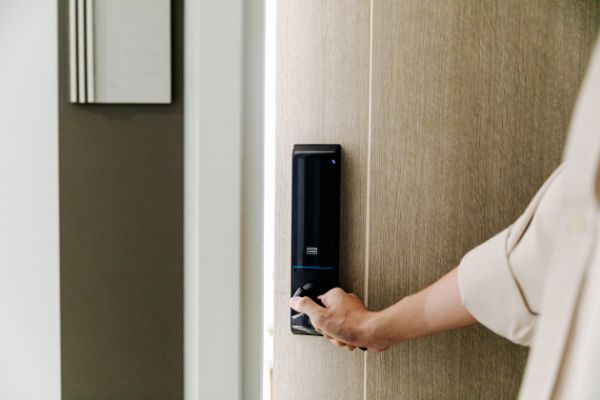Smart home technology has created many misperceptions about electronic locks. While such beliefs may make some homeowners uneasy about adopting such devices, in reality these smart devices provide greater convenience and security than ever before.
By securely personalizing access for renters, tradespeople, mail carriers or package-delivery workers and continually updating them against hacking attempts, these systems allow you to control access securely for each group.

Myth 1: They’re Overly Complex
Many homeowners still view smart door locks as being complex technologies requiring extensive knowledge and special equipment for installation. It’s important to remember that today’s smart lock models are intended to be as user-friendly and straightforward as possible; depending on which lock cover and app you select, installation could involve covering an existing key hole with one, using it with your phone to unlock, or retrofitting over your deadbolt (something most people opt for for added security purposes).
Once installed, smart locks allow users to enter their homes without the use of physical keys, whether via smartphone, PIN code, fingerprint authentication or keypad access. They can even remotely control their lock via an app from anywhere around the world while keeping an eye on when their kids, guests or service providers come and go.
Many modern smart locks are specifically designed to be as secure as possible, with features such as 128-bit encryption for wireless transmissions and bank-grade security standards used to safeguard customer data. Furthermore, they work seamlessly with various other security devices like alarms and cameras so as to monitor who comes and goes and make sure only authorized individuals enter.
Myth 2: They’re Less Secure than Traditional Locks
Most smart locks utilize cutting-edge encryption and authentication techniques to keep your home as secure as possible, working seamlessly alongside security cameras and doorbells to form an integrated home security system that you can monitor from a single app.
People often worry that smart door locks will make it easier for criminals to break in. However, as with any internet-connected device, it’s important to keep in mind that smart locks are susceptible to cyber threats; best practices for protecting home networks should always be observed, including using strong passwords and two-factor authentication when possible.
Many smart door locks also allow users to create virtual keys for guests or family members and grant temporary or long-term permission at the press of a button, providing convenience for professionals or families that travel frequently away from their homes. This feature can be especially helpful for working professionals and families that leave frequently for business or pleasure.
Smart locks are typically straightforward to set up; usually just following an instruction manual or video tutorial can do it alone without prior experience or need for power tools. For some models, installing it could even be as simple as positioning the lock over an existing keyhole and following setup instructions to complete the process.
Myth 3: They Cease to Work When the Power Goes Out
Many still perceive smart locks with mistrust, yet their effectiveness cannot be doubted. While traditional locks may work just as effectively, smart ones have additional features that allow homeowners to manage their security in ways never possible before; from unlocking doors remotely to monitoring who enters or leaves the property remotely; smart locks provide greater convenience and safety than ever.
Smart door locks differ from traditional locks by using RFID readers to scan a registered device’s code and identify whether or not it can unlock it. They also come equipped with backup power options such as battery backups and manual key overrides that ensure access even during a power outage.
Although hacking smart locks is a genuine threat, when used appropriately they’re just as secure as your laptop or smartphone. Staying current on firmware updates and employing best practices for cybersecurity will go far towards keeping them from being compromised by intruders.
Smart locks offer another key benefit compared to traditional locks: virtual keys for people needing temporary access, such as tradespeople or dog walkers; this feature can then be cancelled whenever needed, making smart locks an attractive and secure solution for businesses of any size.
Myth 4: They’re More Expensive than Traditional Locks
Digital locks don’t necessarily cost more than traditional lock mechanisms, though their initial investment can be higher. Over time however, long-term savings on replacement keys and additional security features can offset this initial expense; digital locks also offer increased convenience as you can open doors using codes, fingerprint scans or smartphone apps – providing added peace of mind!
One of the primary concerns with smart locks is their susceptibility to hacking, which allows thieves to gain entry without their key. While no security system can guarantee absolute protection, modern digital locks employ advanced encryption methods which make hacking harder. Furthermore, many also come equipped with alarm systems which notify if someone tampers with them – offering another layer of defense.
Another myth about digital locks is their lack of durability compared to their physical counterparts. While this was true historically, modern electronic lock technology is designed for greater longevity. Hafele RE-Design+ stands out as an outstanding example, constructed of hardened steel construction with anti-tamper mechanisms and compatible with multiple smart home devices and voice assistants such as Amazon Alexa or Google Assistant. Home security cameras also offer many useful features, including remote access, activity logs and customizable access with two-factor authentication (2FA). These advancements make home security cameras an affordable and effective solution for anyone seeking to improve home security – homeowners as well as renters/landlords looking for remote control of their properties remotely.